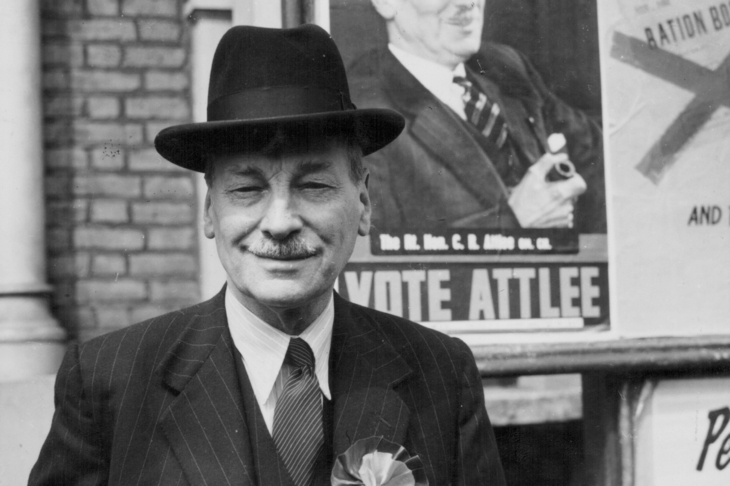To excited cheers, Angela Rayner last week promised Labour supporters that a Jeremy Corbyn-led government ‘would knock the socks off’ the one led by Clement Attlee. Given Attlee oversaw the creation of the NHS and the nationalisation of 20 per cent of the economy while establishing a universalist welfare state, not to mention building nearly one million homes – and all during a time of acute post-war shortages – Rayner’s claim was a brave one.
Given its record, the government elected in 1945 is Labour’s version of Motherhood and Apple Pie. It has long enjoyed a revered status across the party. During the early 1980s, both those who left Labour to form the SDP and the Bennites who forced them out each claimed to be true heirs to Attlee. And while New Labour held a very different attitude to state intervention, Tony Blair and Gordon Brown still asserted they shared Attlee’s ethical motivations.
It was no surprise, therefore, that John McDonnell recently claimed, ‘I’m in the tradition of the Attlee government’. But, as Rayner’s remarks indicate, the Shadow Chancellor wants to go well beyond Attlee’s achievements. Coming from the party’s far-left, McDonnell is, in reality, a harsh critic – as were his counterparts at the time. However much he is now a revered figure, many on the Labour left were impatient with what they took to be Attlee’s moderation. McDonnell also believes Attlee did not go far enough. In his eyes, Attlee could have pushed the boundaries of the state even further, giving workers control of those newly nationalised industries rather than managing them like any capitalist enterprise.
So, as it was 1945, Labour in 2019 proposes to take back the ‘natural monopolies’ of gas, water, electricity and rail. But these nationalised industries will not be run in a top-down manner but instead be subject to input from consumers, employees and local communities. Unlike 1945, Labour says it will intervene in the workings of larger private businesses by creating Inclusive Ownership Funds that will eventually control 10 per cent of the industries’ shares, giving workers a voice in their management as well as a share in their dividends (although most of that will go to government). McDonnell aims ‘to achieve what past Labour governments have [only] aspired to. An irreversible shift in the balance of power and wealth in favour of working people’.
Labour’s 1945 manifesto was certainly infused with aspiration. It claimed its ‘ultimate purpose’ to be ‘the establishment of the Socialist Commonwealth of Great Britain – free, democratic, efficient, progressive, public-spirited, its material resources organised in the service of the British people’. Capitalism was presented as an immoral and inefficient system, albeit one to be abolished gradually and through the ballot box. For its pains, Churchill infamously said Labour wanted to expand the state so much that the party would need a form of Gestapo to make it work. But instead of going beyond its manifesto, Labour in power was beset by so many practical problems that it was forced to consolidate. This meant that when it left office in 1951, Labour had built only a reformed capitalism – one largely left unchanged by the incoming Conservatives – defined by increasing profits, rising affluence and declining poverty.
McDonnell would undoubtedly be deeply disappointed if this was the fate of Labour’s 2019 programme should it be applied in government. But the polls currently suggest a Labour government is one of the least likely of outcomes of this election campaign.
This is probably because Attlee enjoyed one huge advantage not shared by Corbyn. In many respects, Labour’s proposals were to continue the state interventions made necessary by fighting the Second World War. The 1945 manifesto claimed the party, in making its reforms, stood ‘for order as against the chaos which would follow the end of all public control’. The people believed many of Labour’s policies would work because they had been responsible for harnessing the resources of a war-winning economy. They chafed at some of the restrictions that were necessary for fighting the war but they were persuadable that these were vital to winning the peace. Moreover, Attlee was – like most Britons – culturally conservative. So while economically radical, he left private schools intact, revered the monarchy and defined Britain’s national interest in conventional terms. Terms so conventional that he took the lead in forming Nato. Corbyn, by contrast, offers the British people a leap into the dark – and not just economically but also culturally. The manifesto even offers an inquiry into the impact of Britain’s colonial legacy.
While some Corbyn supporters have boldy compared the present Labour leader with Attlee, few others would agree that this most unpopular Leader of the Opposition is even in the same class.
Steven Fielding is Professor of Political History at the University of Nottingham and is writing ‘The Labour Party: from Callaghan to Corbyn’ for Polity Press, to be published in 2021






Comments